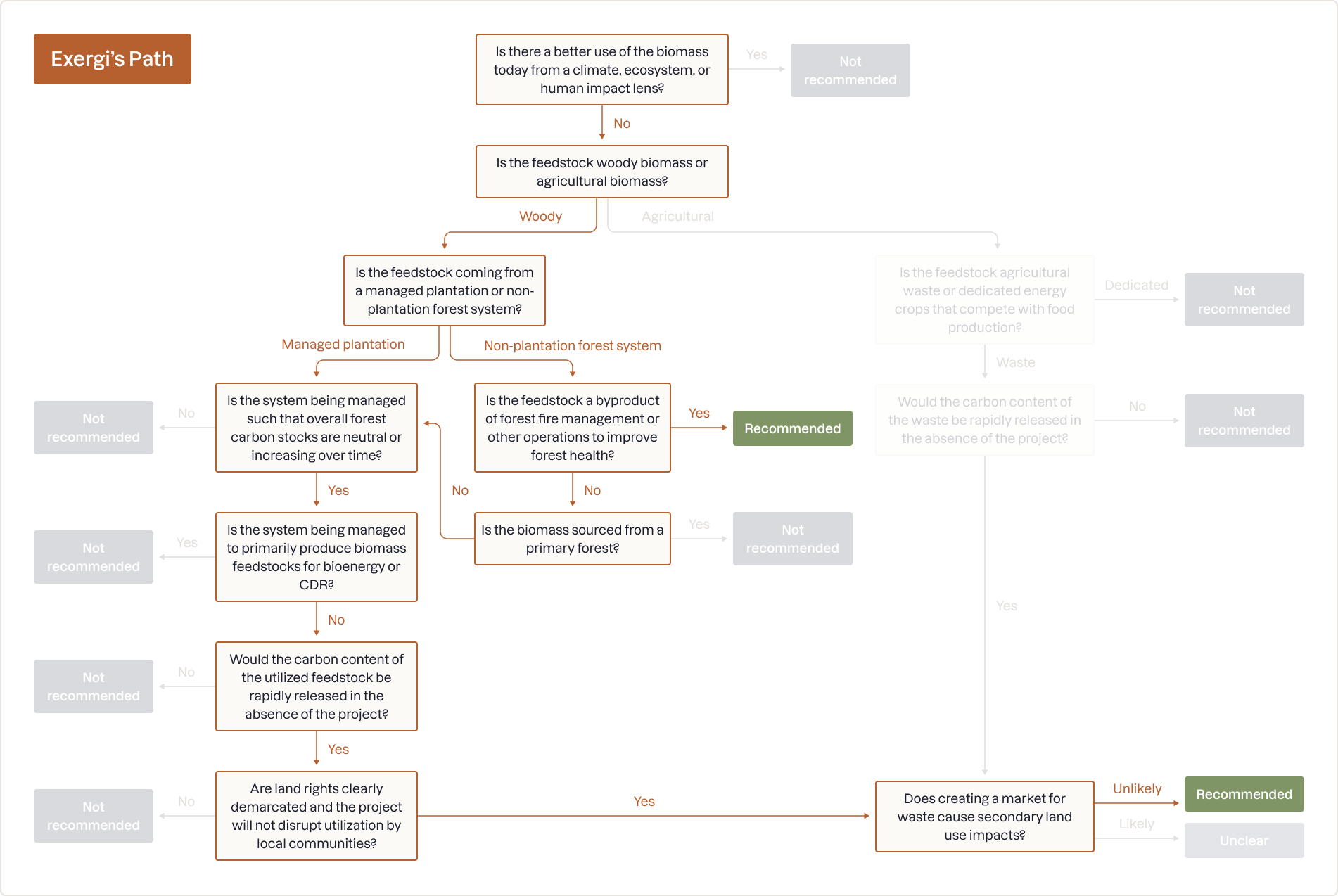June 18, 2024
- This deal supports the first commercial-scale carbon removal retrofit on a biomass-fueled district heating facility.
- Exergi’s CDR retrofit will remove 800,000 tons of CO₂ per year starting in 2028, with a meaningful proportion of the first three years’ output going to Frontier buyers.
- Biomass-based technologies can deliver gigatons of carbon removal at affordable prices, if responsibly designed and executed. Frontier has published a set of Biomass Sourcing Principles that all biomass based projects must meet.
Frontier has facilitated offtake agreements with Stockholm Exergi to enable a carbon removal retrofit on a biomass-based district heating facility. Frontier members will buy $48.6M of the facility’s removal output between 2028 and 2030. The exact volume of tons going to Frontier buyers, and the price per ton, will be announced pending the outcome of a competitive reverse auction being conducted by the Swedish government, in which Exergi hopes to win subsidies. Once finalized, Frontier will report the tons and prices. Exergi’s project will be one of the world’s first commercial-scale carbon removal retrofits on a bioenergy facility.
Responsible biomass-based approaches have the potential to remove 1-5 Gt of carbon annually, and are likely to be one of the many solutions the world will need to reach gigaton-scale. As is the case with conventional climate accounting, carbon removal from this project will contribute to buyers’ voluntary corporate goals and Sweden’s national climate targets.

Exergi will retrofit a state-of-the-art district heating facility in downtown Stockholm. The KVV8 power station combusts woody biomass waste (i.e., treetops, branches, saw mill dust) sourced from Sweden and nearby countries in Europe to produce heat and electricity for 800k Stockholm residents. After biomass combustion, the CO₂ concentration in the flue gas is 18-19%. The retrofit involves reacting this CO₂ with potassium carbonate at high pressure, heating the resulting potassium bicarbonate, and then condensing out the water vapor to leave the CO₂, which is then transported via ship and permanently sequestered deep underground.
At scale, these kinds of bioenergy retrofits could generate 0.5-1.0 gigatons of carbon removal per year at low cost. Exergi’s approach has several advantages:
- Near-term tons at affordable prices, with a trajectory to <$100 per ton: Exergi’s facility has the capacity to deliver 800,000 tons of carbon removal per year, starting in 2028. Further reductions in capex and transportation costs offer a demonstrable path to <$100/ton at scale.
- A track record of robust execution: Exergi has been providing heat and power to Stockholm for over 150 years. Their track record of building and executing large industrial processes will be critical to the success of this first-of-a-kind retrofit.
- Sustainable source of biomass: Exergi uses biomass wastes and residues diverted from Swedish and neighboring countries’ forestry systems where they would otherwise rapidly decay, re-releasing CO₂ into the atmosphere. The retrofit unit is net-energy generating, so the plant will require no additional biomass. Frontier has a set of Biomass Sourcing Principles that Exergi must meet as a condition of its contract, which is elaborated on below.
- Strong community engagement: Based in downtown Stockholm, Exergi has a robust, multi-decade strong relationship with the local community. This community has been highly engaged in the design and build of this project.
- Retrofit of a state-of-the-art district heat facility: KVV8 is a relatively new biomass-based facility in Stockholm that is expected to generate heat and power for many decades to come. Thanks to its advanced heat recovery, the process is extremely energy efficient, and without it, local energy needs would likely be met by carbon-intensive alternatives.
- Highly efficient capture system: Exergi’s HPC (hot potassium carbonate) capture system has demonstrated 90% capture efficiency.
- Operating in a well regulated jurisdiction with strong environmental conduct laws and policies: Exergi is subject to the rules of regulations of Sweden and the European Union, including legislation over the appropriate use of biomass.
Frontier offtakes are paid on delivery. Each payout is contingent on every ton delivered meeting all of its performance criteria.
Frontier expects biomass-based carbon removal approaches to be an important subset of the solutions required to meet the world’s climate goals. However, there are concerns over some existing biomass approaches. Increased demand for biomass could incentivize activities that degrade ecosystems or displace existing community uses. And where biomass approaches are simply moving stable above-ground carbon stores into geological storage, they are likely to have little impact on overall atmospheric carbon levels. There is, rightly, a high degree of scrutiny on this pathway. To ensure the responsible development and scaling of biomass-based carbon removal, Frontier has developed six biomass sourcing principles that build on existing research. These principles are first used to diligence Frontier suppliers’ biomass sourcing strategy and then applied on an ongoing basis to ensure each ton of carbon removal delivered meets the highest standards.
- Use biomass for carbon removal only when there is no other better use for it (i.e when it is considered “waste”)
- Exclude using biomass that would have otherwise stored CO₂ for a long time in the absence of the project
- Ensure that the biomass is sourced from places with a growing stock of carbon
- Use waste biomass instead of biomass grown for the purpose of energy production
- Avoid sourcing from primary forests or other ecologically sensitive areas, and support protecting and/or rehabilitating local natural habitats (e.g. preventing soil erosion and preserving biodiversity)
- Account for the emissions related to the harvesting, transport, and storage of the biomass
Find out more details about each principle here, and how Exergi’s approach performs against these principles below. Exergi is well set-up to execute on the tracking and tracing required to ensure compliance on every ton.
 How Exergi meets Frontier’s Biomass Sourcing Principles
How Exergi meets Frontier’s Biomass Sourcing Principles
Frontier has facilitated purchases on behalf of Frontier founding members Stripe, Alphabet, Shopify, Meta, and McKinsey Sustainability, as well as Autodesk, H&M Group, JPMorgan Chase, and Workday. Also, Aledade, Canva, Samsara, Skyscanner, SKIMS, Wise, and Zendesk have purchased via Watershed’s partnership with Frontier.
Anders Egelrud, the CEO of Stockholm Exergi: “The agreement with Frontier and its prominent member companies is a very strong testimony of the efficiency and sustainability of Stockholm Exergi’s BECCS project. With the determination of frontrunners like Frontier to kick-start the permanent removals industry, we are driving increased ambitions by pooling funding from private and public sources. The primary winner is the climate as we set our societies on track to meet the objectives of the Paris Agreement. The agreement with Frontier is an important milestone towards our final investment decision.”
Hannah Bebbington, Head of Strategy, Frontier: “If Exergi can prove that large-scale, responsible, tightly executed retrofits are possible, it will be truly catalytic and dozens of other facilities will follow. This is a first-of-a-kind industrial project but we have real confidence in this team.”
Eli Mitchell-Larson, Carbon Gap & Oxford Net Zero: “We must find ways to transform biogenic waste for climate benefits while also protecting and increasing EU forest cover. Stockholm Exergi’s proposed bio-CCS retrofit would build on an existing public good—low-carbon district heating with waste biomass. With Frontier’s purchase commitment, Europe comes one step closer toward modeling ‘bio-CCS done right’.”
¹ Based on estimates in Snyder et al (2022)
² Based on IEA analysis of current bioenergy facilities: https://www.iea.org/energy-system/renewables/bioenergy

